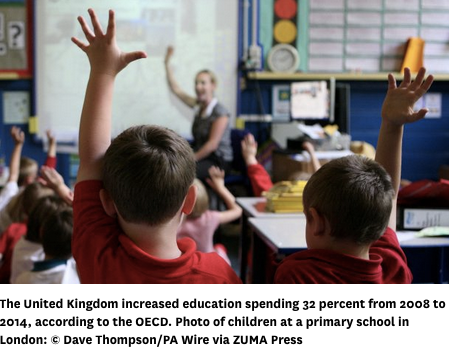he world’s developed nations are placing a big bet on education investments, wagering that highly educated populaces will be needed to fill tomorrow’s jobs, drive healthy economies and generate enough tax receipts to support government services.
Bucking that trend is the United States.
U.S. spending on elementary and high school education declined 3 percent from 2010 to 2014 even as its economy prospered and its student population grew slightly by 1 percent, boiling down to a 4 percent decrease in spending per student. That’s according to the Organization for Economic Cooperation and Development’s annual report of education indicators, released last week.
. . .
And even with the decline in spending, the United States still spends more per student than most countries. The United States spent $11,319 per elementary school student in 2014, compared with the OECD average of $8,733, and $12,995 educating each high school student, compared with an average of $10,106 per student across the OECD.
The way that high-performing countries achieve more with less money is by spending it differently than the United States does. For example, larger class sizes are common in Asia, with more resources instead spent on improving teaching quality. During the period of U.S. budget cuts to education, there weren’t major changes to how the money was allocated.
“If you simply cut spending with your existing spending choices, you will end with less for less,” said Schleicher, citing school districts in Oklahoma that cut the number of school days to four from five each week.
One big way that the U.S. education system differs from others is in asking teachers to carry a heavy teaching load. U.S. teachers teach close to 1,000 hours a year, compared with 600 hours in Japan and 550 hours in Korea. In these countries, teachers might specialize in one course, such as Algebra I, and teach it only a few periods a day. The rest of their work week is spent on other activities, such as preparing lessons or giving feedback to students.




